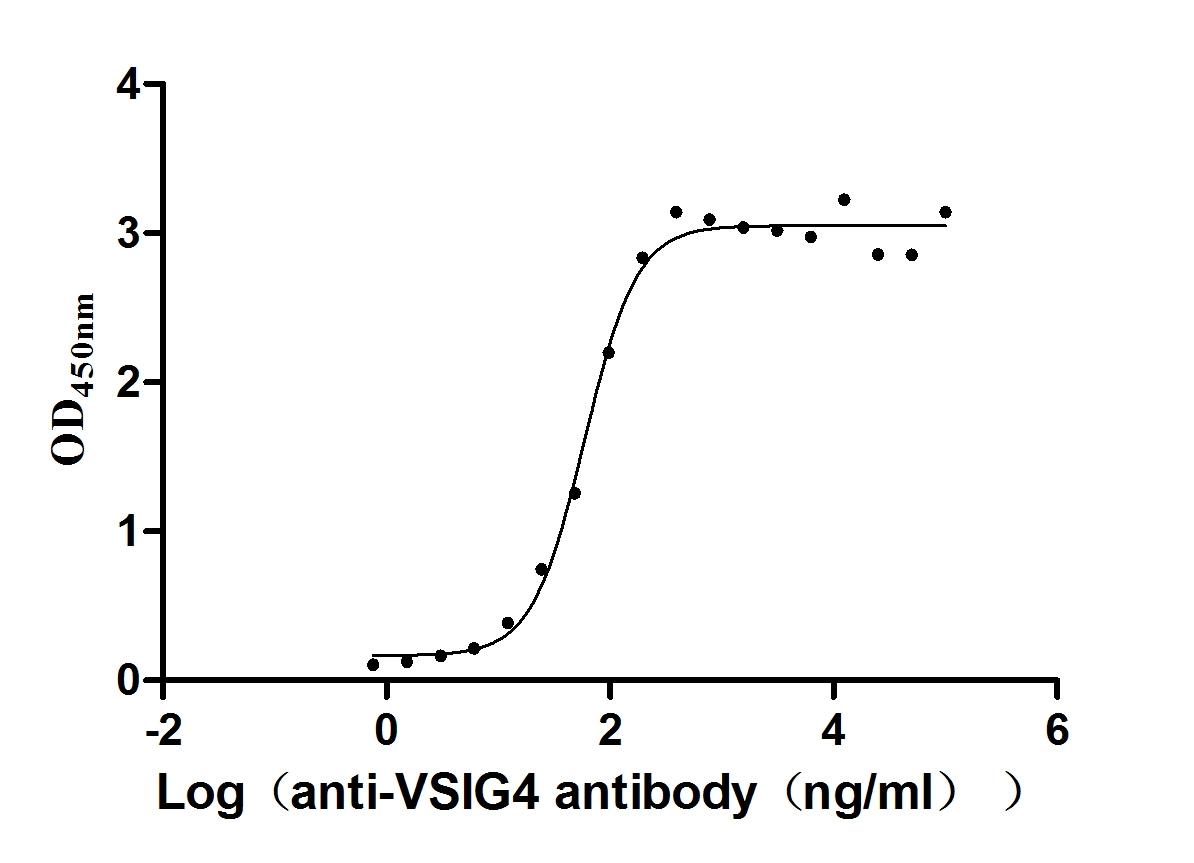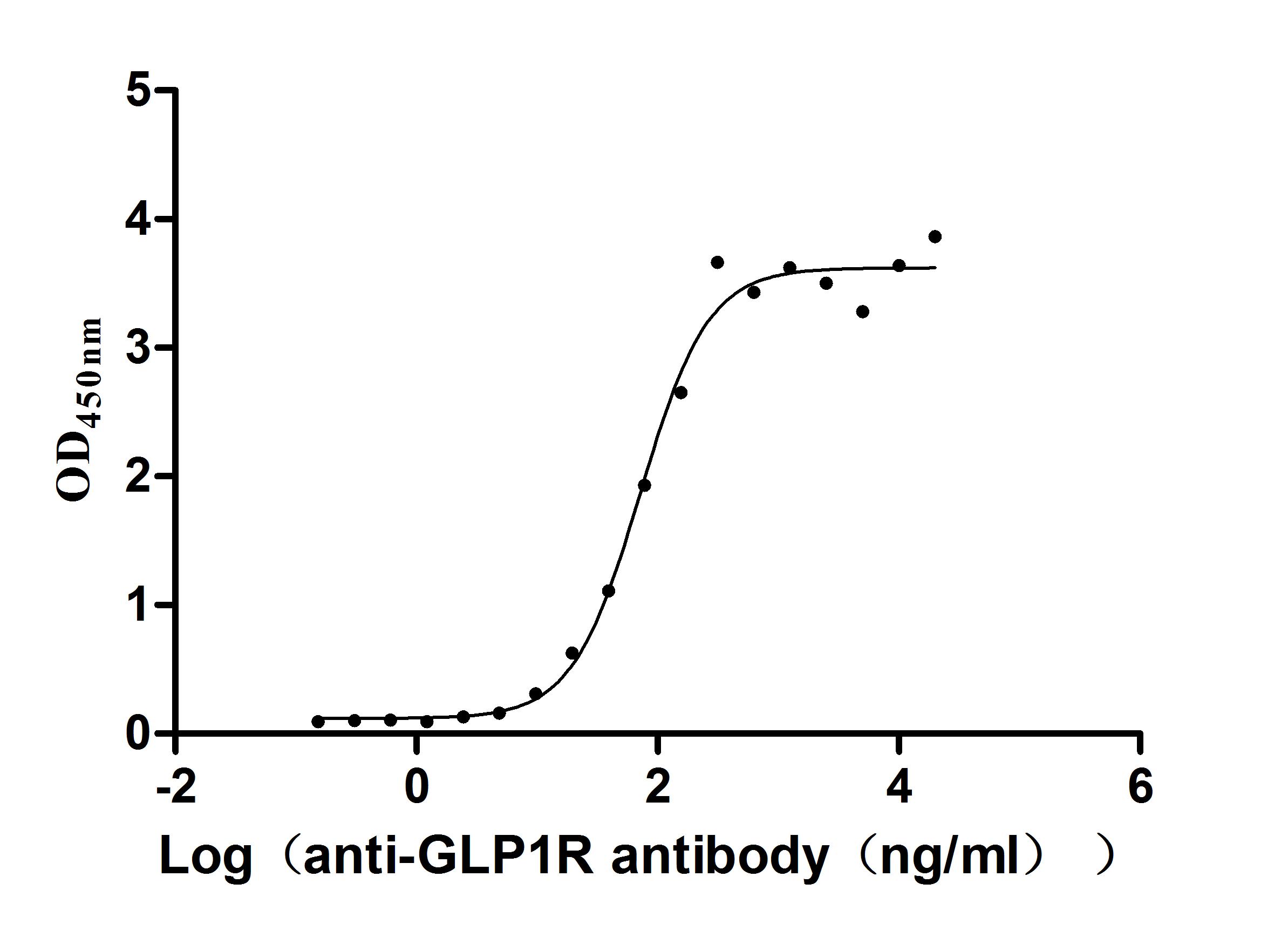Recombinant Human Importin subunit alpha-5 (KPNA1)
-
中文名稱:人KPNA1重組蛋白
-
貨號:CSB-YP012483HU
-
規(guī)格:
-
來源:Yeast
-
其他:
-
中文名稱:人KPNA1重組蛋白
-
貨號:CSB-EP012483HU
-
規(guī)格:
-
來源:E.coli
-
其他:
-
中文名稱:人KPNA1重組蛋白
-
貨號:CSB-EP012483HU-B
-
規(guī)格:
-
來源:E.coli
-
共軛:Avi-tag Biotinylated
E. coli biotin ligase (BirA) is highly specific in covalently attaching biotin to the 15 amino acid AviTag peptide. This recombinant protein was biotinylated in vivo by AviTag-BirA technology, which method is BriA catalyzes amide linkage between the biotin and the specific lysine of the AviTag.
-
其他:
-
中文名稱:人KPNA1重組蛋白
-
貨號:CSB-BP012483HU
-
規(guī)格:
-
來源:Baculovirus
-
其他:
-
中文名稱:人KPNA1重組蛋白
-
貨號:CSB-MP012483HU
-
規(guī)格:
-
來源:Mammalian cell
-
其他:
產(chǎn)品詳情
-
純度:>85% (SDS-PAGE)
-
基因名:KPNA1
-
Uniprot No.:
-
別名:IMA5_HUMAN; Importin alpha 1 subunit; Importin alpha 5; Importin alpha S1; Importin subunit alpha-5; N-terminally processed; IPO A5; IPOA 5; IPOA5; Karyopherin alpha 1; Karyopherin alpha 1 subunit; Karyopherin subunit alpha-1; KPNA 1; KPNA1; mSRP 1; mSRP1; NPI 1; NPI-1; NPI1; Nucleoprotein interactor 1; RAG cohort protein 2; RCH 2; RCH2; Recombination activating gene cohort 2; SRP 1; SRP1 beta; SRP1-beta
-
種屬:Homo sapiens (Human)
-
蛋白長度:Full Length of Mature Protein
-
表達(dá)區(qū)域:2-538
-
氨基酸序列TTPGKENFR LKSYKNKSLN PDEMRRRREE EGLQLRKQKR EEQLFKRRNV ATAEEETEEE VMSDGGFHEA QISNMEMAPG GVITSDMIEM IFSKSPEQQL SATQKFRKLL SKEPNPPIDE VISTPGVVAR FVEFLKRKEN CTLQFESAWV LTNIASGNSL QTRIVIQAGA VPIFIELLSS EFEDVQEQAV WALGNIAGDS TMCRDYVLDC NILPPLLQLF SKQNRLTMTR NAVWALSNLC RGKSPPPEFA KVSPCLNVLS WLLFVSDTDV LADACWALSY LSDGPNDKIQ AVIDAGVCRR LVELLMHNDY KVVSPALRAV GNIVTGDDIQ TQVILNCSAL QSLLHLLSSP KESIKKEACW TISNITAGNR AQIQTVIDAN IFPALISILQ TAEFRTRKEA AWAITNATSG GSAEQIKYLV ELGCIKPLCD LLTVMDSKIV QVALNGLENI LRLGEQEAKR NGTGINPYCA LIEEAYGLDK IEFLQSHENQ EIYQKAFDLI EHYFGTEDED SSIAPQVDLN QQQYIFQQCE APMEGFQL
-
蛋白標(biāo)簽:Tag?type?will?be?determined?during?the?manufacturing?process.
The tag type will be determined during production process. If you have specified tag type, please tell us and we will develop the specified tag preferentially. -
產(chǎn)品提供形式:Lyophilized powder
Note: We will preferentially ship the format that we have in stock, however, if you have any special requirement for the format, please remark your requirement when placing the order, we will prepare according to your demand. -
復(fù)溶:We recommend that this vial be briefly centrifuged prior to opening to bring the contents to the bottom. Please reconstitute protein in deionized sterile water to a concentration of 0.1-1.0 mg/mL.We recommend to add 5-50% of glycerol (final concentration) and aliquot for long-term storage at -20℃/-80℃. Our default final concentration of glycerol is 50%. Customers could use it as reference.
-
儲存條件:Store at -20°C/-80°C upon receipt, aliquoting is necessary for mutiple use. Avoid repeated freeze-thaw cycles.
-
保質(zhì)期:The shelf life is related to many factors, storage state, buffer ingredients, storage temperature and the stability of the protein itself.
Generally, the shelf life of liquid form is 6 months at -20°C/-80°C. The shelf life of lyophilized form is 12 months at -20°C/-80°C. -
貨期:Delivery time may differ from different purchasing way or location, please kindly consult your local distributors for specific delivery time.Note: All of our proteins are default shipped with normal blue ice packs, if you request to ship with dry ice, please communicate with us in advance and extra fees will be charged.
-
注意事項:Repeated freezing and thawing is not recommended. Store working aliquots at 4°C for up to one week.
-
Datasheet :Please contact us to get it.
相關(guān)產(chǎn)品
靶點詳情
-
功能:Functions in nuclear protein import as an adapter protein for nuclear receptor KPNB1. Binds specifically and directly to substrates containing either a simple or bipartite NLS motif. Docking of the importin/substrate complex to the nuclear pore complex (NPC) is mediated by KPNB1 through binding to nucleoporin FxFG repeats and the complex is subsequently translocated through the pore by an energy requiring, Ran-dependent mechanism. At the nucleoplasmic side of the NPC, Ran binds to importin-beta and the three components separate and importin-alpha and -beta are re-exported from the nucleus to the cytoplasm where GTP hydrolysis releases Ran from importin. The directionality of nuclear import is thought to be conferred by an asymmetric distribution of the GTP- and GDP-bound forms of Ran between the cytoplasm and nucleus. In vitro, mediates the nuclear import of human cytomegalovirus UL84 by recognizing a non-classical NLS.
-
基因功能參考文獻(xiàn):
- Importin alpha1 is specifically required for the nuclear localization of several important HSV1 proteins, capsid assembly, and capsid egress into the cytoplasm, and may become rate limiting in situ upon infection at low multiplicity or in terminally differentiated cells such as neurons. PMID: 29304174
- Karyoppherins constitute integral constituents of the nuclear pore complex whose barrier, transport, and cargo release functionalities establish a continuum under a mechanism of Kap-centric control. PMID: 28864541
- Data suggest that EV71 infection in enterocytes does not inhibit phosphorylation of STAT1/2 induced by IFN-beta, but p-STAT1/2 transport into the nucleus is significantly blocked; EV71 infection in enterocytes down-regulates expression of KPNA1 and induces degradation of cellular KPNA1 via caspase-3. [EV17 = Enterovirus 71] PMID: 28455446
- Data show that cytoskeleton associated protein 5 (chTOG) only weakly promotes importin-regulated microtubule nucleation, but acts synergistically with TPX2 protein. PMID: 26414402
- BIG3 may block the KPNAs (KPNA1, KPNA5, and KPNA6) binding region(s) of PHB2. PMID: 26052702
- miR-223 downregulation promotes glomerular endothelial cell activation by upregulating importin alpha4 and alpha5 in IgA nephropathy PMID: 24284509
- Bel1 fragment with residues 215-223, which bears the NLS, interacts with KPNA1, KPNA6, and KPNA7. PMID: 25272585
- Results indicate CTNNBL1 as a unique selective nuclear localization signals (NLSs)-binding protein with striking differences from karyopherin-alphas. PMID: 24269683
- This supports the notion that de novo mutations KPNA1 in are extremely rare in schizophrenia PMID: 23425335
- LRRC59 facilitates transport of cytosolic FGF1 through nuclear pores by interaction with Kpns and movement of LRRC59 along the ER and NE membranes PMID: 22321063
- mTOR and protein phosphatase 2A catalytically control the constitutive nuclear import of latent STAT1 by KPNA1, which are key modulators of STAT1 expression and apoptosis. PMID: 22399302
- the requirement for and the regulation of CAS in the functioning of the Vpr-Impalpha complex PMID: 22110766
- Nucleoporin Nup50 stabilizes closed conformation of armadillo repeat 10 in importin alpha5. PMID: 22130666
- The ability of hnRNP C1/C2 to bind KPNA1 is diminished in the presence of VP24, and cells transiently expressing VP24 redistribute hnRNP C1/C2 from the nucleus to the cytoplasm. PMID: 21987768
- This study reports the identification and classification of importin alpha 5 -interacting proteins in brain cells. PMID: 21307607
- The mammalian E1 subunits can be imported separately, identify nuclear localization signals (NLSs) in Aos1 and in Uba2, and demonstrate that their import is mediated by importin alpha/beta in vitro and in intact cells. PMID: 21209321
- Impalpha5 acts as a chaperone until Influenza a virus nucleoprotein (NP) is delivered in the nucleus for viral RNA encapsidation. PMID: 20974480
- Study identified the sequences KKKRR, KKKRK, and KKRKK as the optimal sequences for binding to this site for mouse importin-alpha2, human importin-alpha1, and human importin-alpha5, respectively. PMID: 20406804
- The papillomavirus E2 proteins preferentially interacted with alpha importins 3 and 5, and showed very weak or no interaction with the other three widely expressed alpha importins (alpha1, alpha 4, and alpha 7). PMID: 20193720
- The VP24 IFN antagonist function of ebolavirus requires the ability of VP24 to interact with KPNalpha. PMID: 19889762
- arginine/lysine-rich nuclear localization signals mediate interactions between dimeric STATs and importin alpha 5 PMID: 12048190
- one importin alpha molecule is able to use either its N- or C-terminal arm repeats for binding various NLS containing proteins PMID: 12740372
- Importin alpha5 and alpha7 bind to Stat3 upon cytokine stimulation. PMID: 16298512
- the karyopherin alpha NPI-1, a nuclear import adaptor, bound more strongly to Epstein-Barr virus nuclear antigen 1 Ser385-phosphorylated nuclear localization signal than to any other phosphorylated or nonphosphorylated forms PMID: 16439554
- Here, VP24 is demonstrated to interact with endogenous karyopherin alpha1 and inhibits its interaction with STAT1. PMID: 17928350
- importins alpha5 and beta1 associate with Nrf2, an interaction that was blocked by the nuclear import inhibitor SN50 PMID: 18238777
- NPI-1 subfamily accumulates in the nucleus in response to oxidative stress, like importin alpha1/Rch1. PMID: 18707546
- significant KPNA1-, NLRP1- and NLRP3-gene expression phenotypes associated with human genotypes of Crohn's disease, Huntington's disease and rheumatoid arthritis PMID: 19001869
- PB2 interaction with alpha-importins is required for virus RNA replication. PMID: 19066626
- Karyopherin alpha 1 is a putative substrate of the RAG1 ubiquitin ligase. PMID: 19118899
顯示更多
收起更多
-
亞細(xì)胞定位:Cytoplasm. Nucleus.
-
蛋白家族:Importin alpha family
-
組織特異性:Expressed ubiquitously.
-
數(shù)據(jù)庫鏈接:
Most popular with customers
-
Recombinant Human Macrophage migration inhibitory factor (MIF) (Active)
Express system: Mammalian cell
Species: Homo sapiens (Human)
-
Recombinant Human T-cell immunoreceptor with Ig and ITIM domains (TIGIT), partial (Active)
Express system: Mammalian cell
Species: Homo sapiens (Human)
-
Recombinant Human V-set and immunoglobulin domain-containing protein 4 (VSIG4), partial (Active)
Express system: Mammalian cell
Species: Homo sapiens (Human)
-
Recombinant Human Glucagon-like peptide 1 receptor (GLP1R), partial (Active)
Express system: Mammalian cell
Species: Homo sapiens (Human)
-
Recombinant Human Tumor-associated calcium signal transducer 2 (TACSTD2), partial (Active)
Express system: Mammalian cell
Species: Homo sapiens (Human)
-
Recombinant Mouse Cell adhesion molecule 1 (Cadm1), partial (Active)
Express system: Mammalian cell
Species: Mus musculus (Mouse)
-
Recombinant Human Kidney-associated antigen 1(KAAG1) (Active)
Express system: E.coli
Species: Homo sapiens (Human)



















